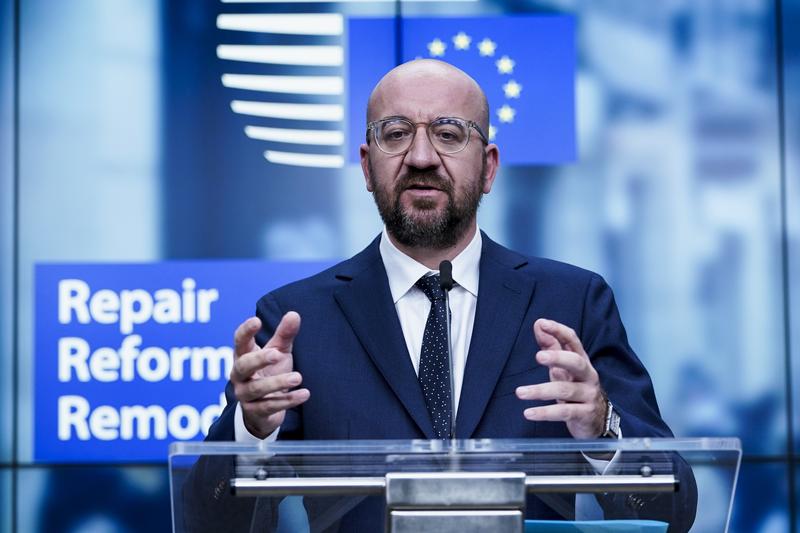 European Council President Charles Michel speaks during a media conference at the European Council building in Brussels, July 10, 2020. European Council President Charles Michel presented updated proposals for the EU's long-term budget and post-coronavirus recovery plan ahead of a summit next week in Brussels where heads of state and government leaders will try to agree on a compromise. (KENZO TRIBOUILLARD, POOL PHOTO VIA AP)
European Council President Charles Michel speaks during a media conference at the European Council building in Brussels, July 10, 2020. European Council President Charles Michel presented updated proposals for the EU's long-term budget and post-coronavirus recovery plan ahead of a summit next week in Brussels where heads of state and government leaders will try to agree on a compromise. (KENZO TRIBOUILLARD, POOL PHOTO VIA AP)
BRUSSELS - European Council President Charles Michel on Friday proposed setting up a 5-billion-euro (US$5.6 billion) emergency fund for any unforeseen consequences of Brexit on European member states.
As he unveiled his latest proposal for a long-term European Union (EU) budget that will be debated over by EU leaders next week, Michel said he saw the need for such a fund because Brexit was going to be a challenge that all EU states have to face.
We know that probably by the end of the summer or in September, October, we will have a clearer vision about where we are in these negotiations process which is not easy
Charles Michel, European Council president
With or without an agreement between Britain and the 27-member EU on future ties will have consequences on Europe. The EU and Britain are currently locked in discussions to agree on the basis of trade relations following the end of the year when the Brexit transition phase comes to an end.
"We know that probably by the end of the summer or in September, October, we will have a clearer vision about where we are in these negotiations process which is not easy," Michel said.
The announcement came a day after the European Commission adopted a Communication to help national authorities, businesses and citizens prepare for the inevitable changes that will arise at the end of the transition period.
READ MORE: EU leaders to clash over money as Brexit blows hole in budget
Changes will occur to cross-border exchanges between the EU and Britain as of Jan. 1 of 2021, irrespective of whether an agreement on a future partnership has been concluded or not, it said.
The European Commission pledged to "work closely with national authorities, businesses and other stakeholders over the coming months to help them prepare for the far-reaching changes that will occur at the end of the year, irrespective of whether an agreement is found."
Please-all recovery plan
In his budget, Michel also offered concessions to countries across the EU, hoping to bridge differences between national leaders when they meet next week.
The COVID-19 pandemic is the latest big challenge for the 27-nation EU after it struggled with a debt crisis a decade ago, chaotic mass migration, and then the trauma of Brexit
Michel, who will chair the first face-to-face meeting of European Union leaders since coronavirus lockdowns were lifted, proposed a smaller 2021-27 budget in a bid to make a mass economic stimulus more palatable to thrifty northern countries.
He proposed a long-term EU budget of 1.074 trillion euros - down from the European Commission’s suggested 1.094 trillion - and a recovery fund of 750 billion euros for pandemic-hammered economies, with two-thirds in grants and a third in loans.
“The COVID-19 crisis presents Europe with a challenge of historic proportions,” Michel told a news conference.
“We are slowly exiting the acute health crisis. While utmost vigilance is still required on the sanitary situation, the emphasis is now shifting to mitigating the socio-economic damage.”
The COVID-19 pandemic is the latest big challenge for the 27-nation EU after it struggled with a debt crisis a decade ago, chaotic mass migration, and then the trauma of Brexit.
Some leaders have even framed it as existential for the bloc, saying it cannot be seen to fail this time as eurosceptic feeling mounts in countries such as Italy.
The proposal for the seven-year budget is known in Brussels jargon as the “negotiating box”, a complex set of numbers covering spending on areas from support for agriculture to regional development, research and scholarships.
This is the starting point for negotiations between the 27 national leaders when they meet on July 17-18.
EU summits that involve money are always the most fraught, and sometimes haggling goes into an extra day or two, which is why leaders often pack for a “four-shirt” trip to Brussels.
Although setting the budget - called the multiannual financial framework (MFF) - is an arcane process, the stakes are high because such huge sums are involved.
READ MORE: France, Germany appeal for swift EU deal on virus recovery aid
This time, the negotiations are even more critical and complicated because the leaders will also try to agree on the recovery fund, and member states are trying to trade concessions in one against benefits in the other.


